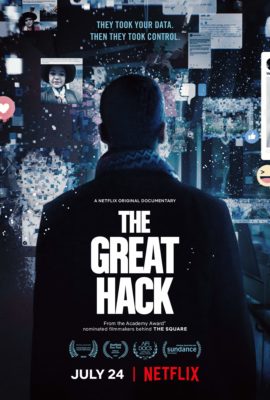As much as I consider myself a fairly well-informed and engaged activist, I did not closely follow the Facebook hearings and Cambridge Analytical data scandal that were prominent in the news throughout 2018.
I knew some unethical things had been done with data that allowed a lot of fake news and political ads to spread on Facebook, including in the lead-up to the 2016 Presidential election, but watching The Great Hack (now streaming on Netflix), my first response was, “Yikes! How was this allowed to happen and how has nothing been done to prevent these things from continuing?!”
Here’s a quick primer.
Cambridge Analytica got an app from a Cambridge University data scientist that had several hundred thousand Facebook users complete a survey which in the process gave access not just to their own Facebook data, but to all of their connections’ Facebook data as well. Therefore Cambridge Analytica got personal data on millions of Facebook users without their knowledge or consent.
They then used this data in their work with various political campaigns. Using the data, campaigns could target specific people in specific locations with specific ads that were the most likely to persuade that person, based on the data.

Release Year: 2019
Directors: Karim Amer, Jehane Noujaim
Running Time: 1 hour, 53 minutes
Watch trailer
While this may sound somewhat innocuous or like it couldn’t have much impact, when you learn more, it becomes clear how insidious and dangerous this technology is, especially in the context of elections.
“The Great Hack” is very effective in telling what happened and why it matters. The filmmakers start with David Carrol, an Associate Professor at the Parson School of Design, where he teaches classes on digital media and app development. He explains the basics of what data is collected on people and how it can be used.
“All of my interactions, my credit card swipes, web searches, locations, my likes, they’re all collected in real time and attached to my identity, giving any buyer direct access to my emotional pulse. Armed with this knowledge, they compete for my attention, feeding me a steady stream of content built for and seen only by me… What I like, what I fear, what my boundaries are, and what it takes to cross them.”
In the United States, Cambridge Analytica worked with Senator Ted Cruz in the Republican presidential primary, and were credited with helping him win the Iowa caucuses. Later, they worked with the Trump campaign, and because of their previous work with Cruz, they already had amassed fourteen months of data and research that they were able to hand over to the Trump team.
The digital branch of the Trump campaign was called Project Alamo, and they had an office that housed people not just from Cambridge Analytica but also from Facebook and Google (though when asked in a congressional hearing by Washington’s Maria Cantwell if anyone from Facebook worked with Cambridge Analytica on the Trump campaign, Facebook founder and CEO Mark Zuckerberg said he didn’t think anyone had). At its peak, the Trump campaign was spending over $1 million a day on Facebook ads.
Trump’s 2016 digital campaign manager, who is now his 2020 campaign manager, claims that they ran 5.9 million visual ads on Facebook, compared to only 66,000 for the Clinton campaign. While we can have plenty of discussions about campaign strategy and ad budgeting, it is not just the volume of ads that made the Trump campaign effective, rather it was the unethically-begotten data and potentially illegal ways they used that data that is the real problem.
Carole Cadwalladr is an investigative journalist at The Guardian in London who has been investigating Cambridge Analytica, especially how it was tied to the Brexit campaign. She got former Cambridge Analytica employee Christopher Wylie to start talking with her. The film features a compelling video interview she conducted with him, in which she asks him about the way Cambridge Analytica collected data on people without their knowledge or consent.
At one point in the film, Cadwalladr asks:
“You didn’t ever stop and think, ‘Actually, this is people’s personal information, and we’re taking it and we’re using it in ways that they don’t understand?’ ”
Wylie replies:
“No. Throughout history you have examples of grossly unethical experiments.”
“Is that was this was?” Cadwalladr asks.
“I think that yes, it was a grossly unethical experiment,” Wylie says.
“You are playing with the psychology of an entire country without their consent or awareness. And not only are you, like, playing with the psychology of an entire nation, you are playing with the psychology of an entire nation in the context of the democratic process.”
At another point in the film, Wylie talks more about the nature of Cambridge Analytica, and one of its founders, Steve Bannon, former executive of ultra-conservative Breitbart News and key Trump strategist and advisor.
“He follow this idea of the Breitbart doctrine,” says Wylie, “which is that if you want to fundamentally change society, you first have to break it…[Cambridge Analytica] is the weapon that Bannon wanted to build to fight his culture war.”
“It’s incorrect to call Cambridge Analytica a purely sort of data science company or an algorithm company,” Wylie says. “It is a full service propaganda machine.”
Backing up this characterization is Brittany Kaiser, another former Cambridge Analytica employee, who was much higher up than Wylie, and much more hesitant to share her story. Once investigations started, however in both the United States and the United Kingdom, she started cooperating and sharing what she knew.
In a committee hearing in the United Kingdom, she said that the psychographics used by Cambridge Analytica were “weapons grade” and therefore should not be used without the permission of the government.
SCL, the British parent company to Cambridge Analytica, started out as a military contractor, including doing psychological operations (“PSYOPS”), or “communications warfare,” so it is not hard to believe that the company would use the same techniques in their other work.
In the fallout from the multiple investigations and a damaging undercover video of Cambridge Analytica’s CEO, the company shut down and filed for bankruptcy in May 2018. Some wonder if this was done to avoid more investigations, punishment, and to get rid of or to avoid having to release data.
Cadwalladr emphasizes that, although Cambridge Analytica is gone, there is still the much bigger and more worrying story that “our personal data is out there and being used against us in ways we don’t understand.”
She questions if any country can really have free and fair elections because of Facebook and how it can and has been used.
“These platforms which were created to connect us have now been weaponized,” she explains. “And it’s impossible to know what is what because it’s happening on exactly the same platforms that we chat to our friends or share baby photos. Nothing is what it seems.” Cadwalladr has a TED Talk that is well worth an additional fifteen minutes of your time to watch.
Even an early Facebook investor, Roger McNamee, has come out against the way Facebook is complicit in the demeaning of our democracy.
“Facebook is designed to monopolize attention. Just taking all the basic tricks of propaganda, marrying them into the tricks of casino gambling. You know slot machines and the like. And basically playing on instincts, and fear and anger are the two most dependable ways of doing that. And so they created a set of tools to allow advertisers to exploit that emotional audience with individual-level targeting. There’s 2.1 billion people, each with their own reality. And once everybody has their own reality, it’s relatively easy to manipulate them.”
Being informed media consumers is important, and especially so when on social media like Facebook. Don’t believe everything you read, and know that pretty much everything you see is determined by Facebook’s algorithms which favor content that they have been paid to put in your feed.
There are so many more details to this whole scandal and more interesting people that make for a fascinating story. I strongly recommend watching the film to get the full benefit. “The Great Hack” is now streaming on Netflix.

